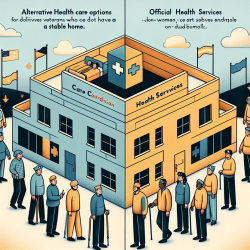Introduction: Aligning Prioritization with Local Needs
In the realm of speech-language pathology, data-driven decisions are paramount for achieving optimal outcomes for children. The recent study titled "A Rapid Review of COVID-19 Vaccine Prioritization in the U.S.: Alignment between Federal Guidance and State Practice" offers insights into how federal guidance can be aligned with state practices to improve health outcomes. This blog explores how speech-language pathologists can apply these findings to enhance their practice and advocate for equitable resource allocation.
Key Findings from the Research
The study highlights significant variability in how states prioritized COVID-19 vaccinations compared to federal guidelines. While healthcare workers and those in long-term care facilities were largely prioritized in line with federal guidance, essential workers and socially vulnerable groups often faced disparities. This variability underscores the need for federal guidelines that are sensitive to local needs and constraints.
Implications for Speech-Language Pathologists
Speech-language pathologists can draw several lessons from this research:
- Data-Driven Advocacy: Just as the study emphasizes the importance of aligning federal guidelines with state practices, speech-language pathologists should advocate for data-driven decisions in their field. This includes using evidence-based practices to tailor interventions to the unique needs of each child.
- Equitable Resource Allocation: The variability in vaccine prioritization highlights the importance of equitable resource allocation. Speech-language pathologists can play a crucial role in advocating for resources that address the needs of underserved populations, ensuring that all children have access to necessary services.
- Collaboration with Stakeholders: The study suggests that federal guidelines should reflect local values and constraints. Similarly, speech-language pathologists should collaborate with educators, healthcare providers, and policymakers to develop interventions that are culturally and contextually relevant.
Encouraging Further Research
The study's findings also encourage further research in speech-language pathology. Practitioners should explore how local factors influence the effectiveness of interventions and seek to understand the diverse needs of the populations they serve. By conducting research that reflects local contexts, speech-language pathologists can contribute to the development of more effective and equitable practices.
Conclusion: A Call to Action
The variability in COVID-19 vaccine prioritization serves as a reminder of the importance of aligning guidelines with local needs. Speech-language pathologists have a unique opportunity to apply these lessons to their practice, advocating for data-driven, equitable, and contextually relevant interventions. By doing so, they can help ensure that all children receive the support they need to thrive.
To read the original research paper, please follow this link: A Rapid Review of COVID-19 Vaccine Prioritization in the U.S.: Alignment between Federal Guidance and State Practice.










